eBay Sales Tax & 1099-K Forms
Confusion about how eBay handles sales tax on 1099-K forms bubbled up this week on the eBay for Business podcast. Discussing the new lower $600 limit for issuing a 1099-K, podcast host Jim "Griff" Griffith said:
The gross amount, by the way, will include things like sales tax that eBay collects on your behalf from buyers, even though you never see the money. So that gross amount on your form 1099 K we'll include things like that money.
This directly contradicts what eBay's own help page about the 1099K says:
Additionally, Form 1099-K does not include the sales tax when it is automatically collected and remitted by eBay.
eBay changed that help page earlier this year, previously it was even more explicit:
Starting in 2019, any sales tax collected by eBay on sales made by you in the various marketplace states will not be on your Form 1099-K. This is because eBay automatically collects and remits such sales tax directly to the state (i.e. the sales tax for these states isn’t paid to you).
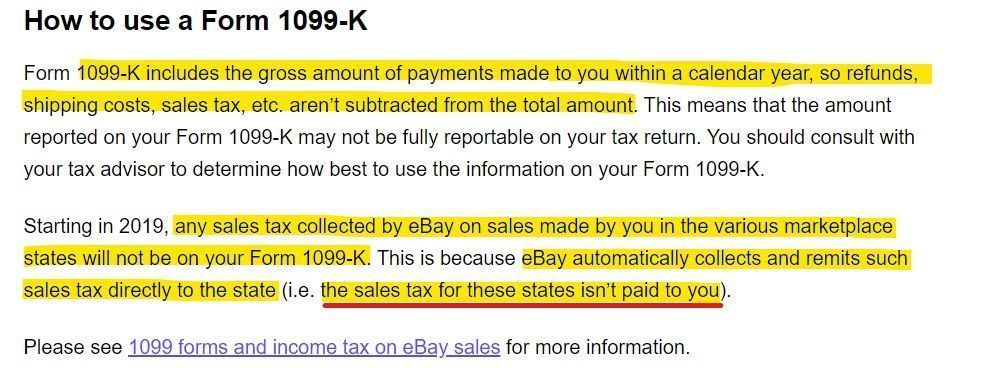
Wanting to make sure I hadn't missed something, I asked Griff on Facebook if there had been a change to how eBay handles sales tax on the 1099-K. Griff acknowledged the error and confirmed there had been no changes.
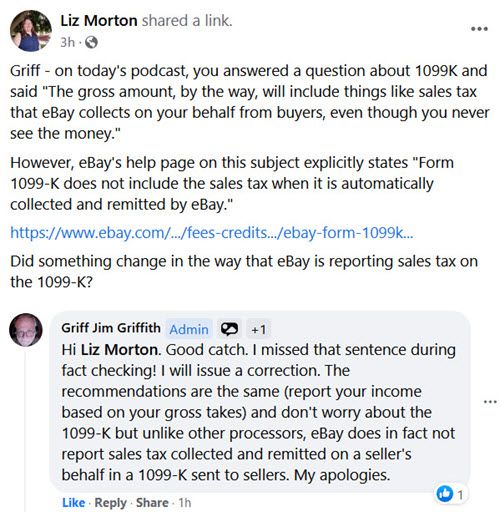

Shortly thereafter, I received a notice that post had been removed, saying the audio was being corrected and citing the desire to avoid additional confusion.

The audio and transcript for the podcast were edited to say the following:
Unlike other payment processors, when it comes to 1099-Ks eBay actually does not report sales tax it collects from buyers on your behalf.So that figure, that gross figure is not included in the gross that's shown on your 1099-K.
Unfortunately, this answer doesn't quite give the full picture either - there is an important distinction between seller collected and eBay collected tax that Griff left out.
So in the interest of really avoiding future confusion, here's how it works:
It's pretty simple really - money that is paid to the seller is included on the 1099-K, money that is not paid the seller is not included.
For the purposes of sales tax, that means seller collected tax is included in the 1099-K, because it is paid to the seller who then remits it to the state.
eBay collected sales tax (marketplace facilitator tax) is not included in the 1099-K because eBay collects that money from the buyer then remits it directly to the state - it is never paid to or received by the seller.
Why The Confusion?
When PayPal was processing the payments, the full amount including both seller collected and eBay collected tax was processed and paid directly to the seller, then any eBay collected (marketplace facilitator) tax was deducted from the seller's PayPal account and sent to eBay.
This is why PayPal and other payment processors include sales tax in the 1099-K form they issue for sellers who meet the requirements- it's based on the total amount of money actually being processed and paid to the seller.
Many sellers assumed that Managed Payments worked the same way, but that doesn't appear to be the case with eBay's chosen payment processor, Adyen.
Earlier this year, there was a lot of confusion in the eBay community about this issue, so I asked the eBay Managed Payments team to add some clarity.
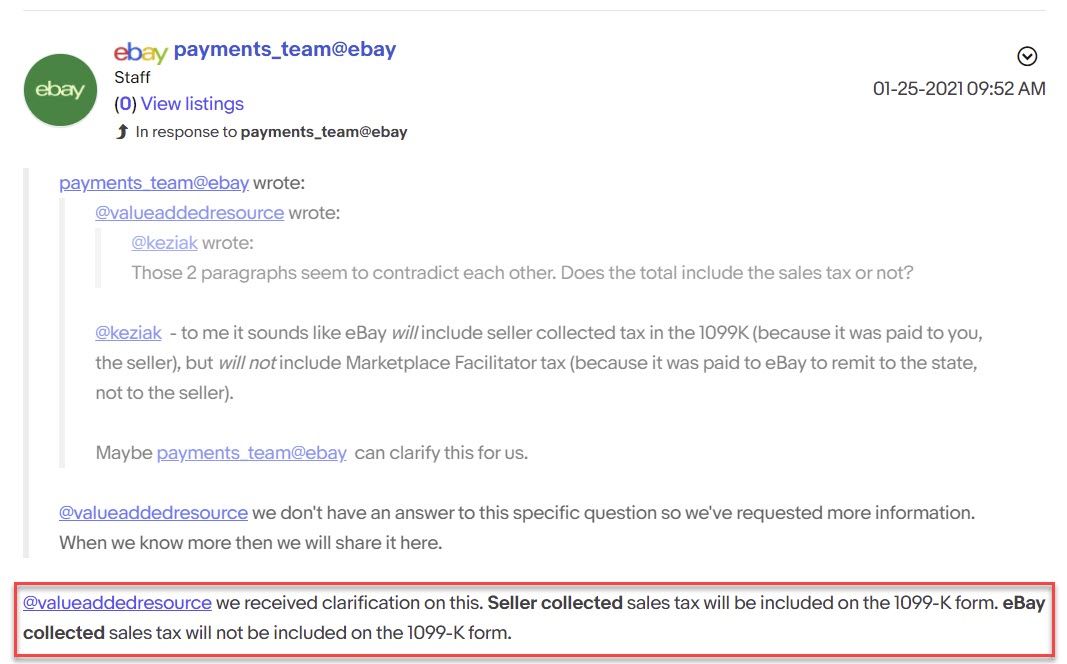
Their answer got me wondering how exactly does the money flow work with Adyen? I have no inside information or confirmation, but I'm guessing eBay is using a customized version of Adyen's Platform solution.
This is a generic image from Adyen's site, so it may not be an exact representation of eBay's set up, but it's clear from eBay's help pages that eBay collected sales tax money is never paid to sellers.
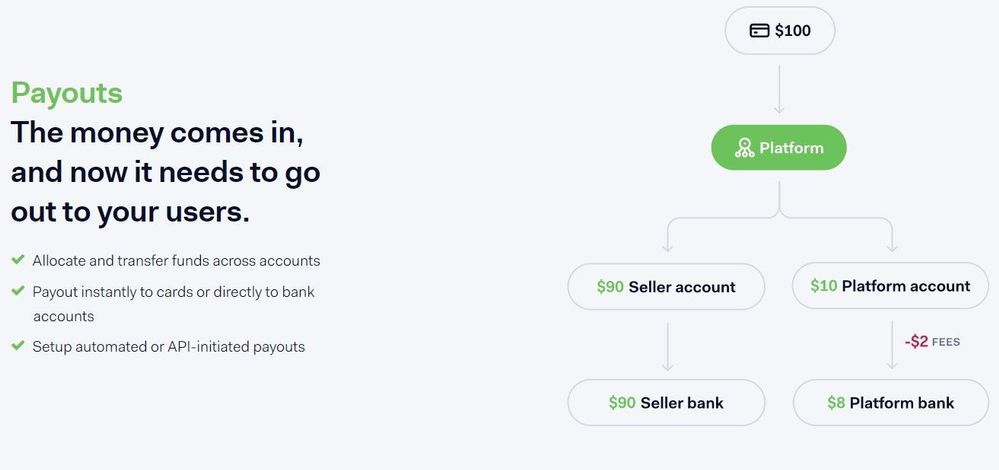
The money flow is likely similar to this image - full amount goes from the buyer to the Platform then certain amounts are allocated to the Seller account and other amounts (fees and eBay collected taxes) to the Platform account (eBay) separately.
Legally, eBay can only include money actually paid to sellers on the 1099-K, so in this scenario eBay collected tax would not apply.
The last few states which had not jumped on board the remote tax wagon have finally passed their own Marketplace Facilitator laws. Florida and Kansas remote sales tax laws took effect on July 1st, 2021 and Missouri's law will be effective in 2023.
eBay provides a sales tax table for sellers to set the rates and apply tax on shipping for states where they may still have an obligation to collect sales tax directly. Currently that may include Missouri, American Samoa, Guam, Northern Mariana Islands, Palau, and US Virgin Islands.
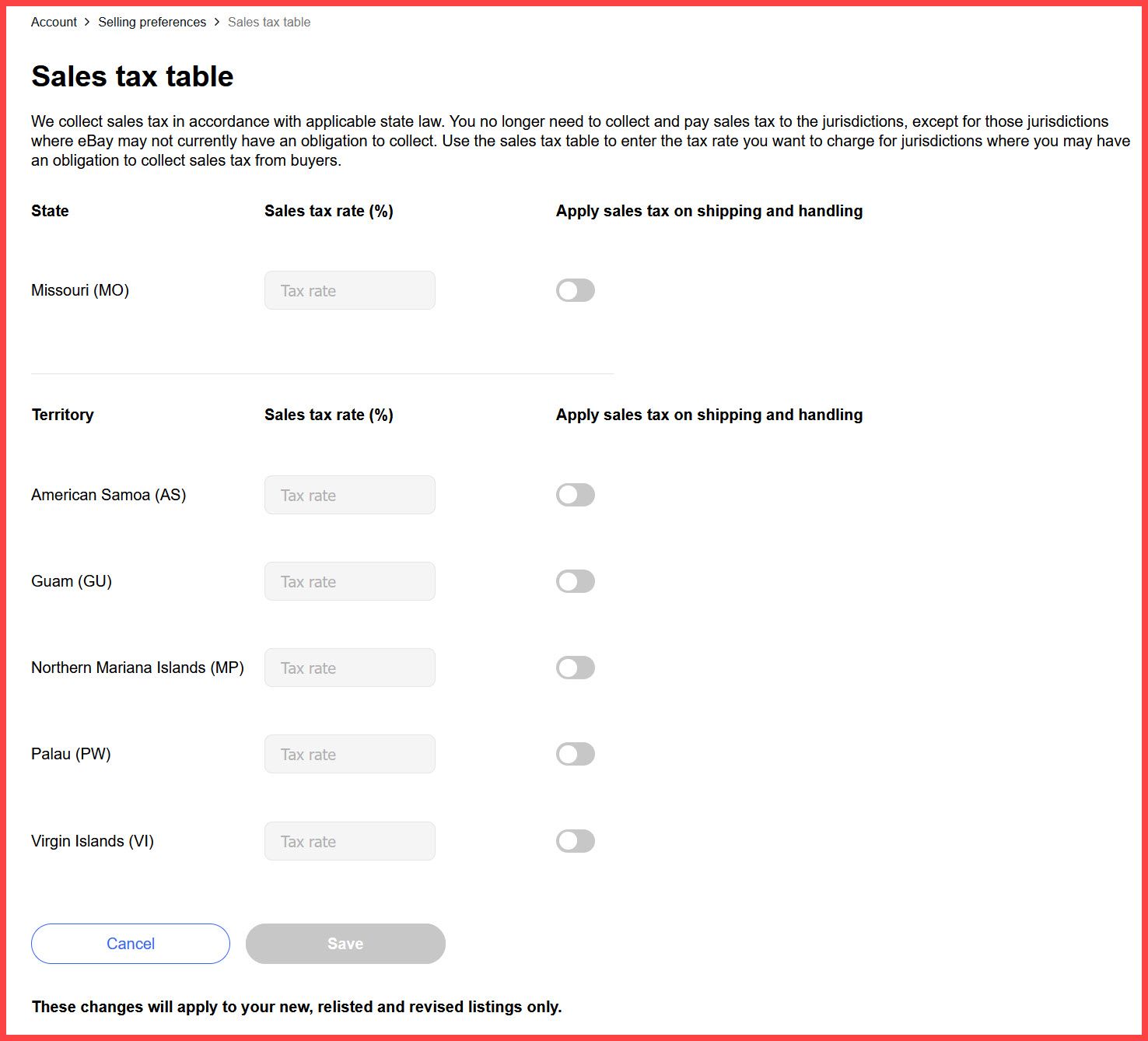
Every state or territory has their own laws and regulations regarding sales tax nexus - I'm not a tax expert and highly encourage sellers who believe they may have an obligation to collect and remit tax in any of these locations to contact a qualified accountant or relevant department of revenue.
So the complete answer to Griff's podcast question is - sales tax paid to and remitted by the seller directly is included in the 1099-K, sales tax collected and remitted by eBay is not.















